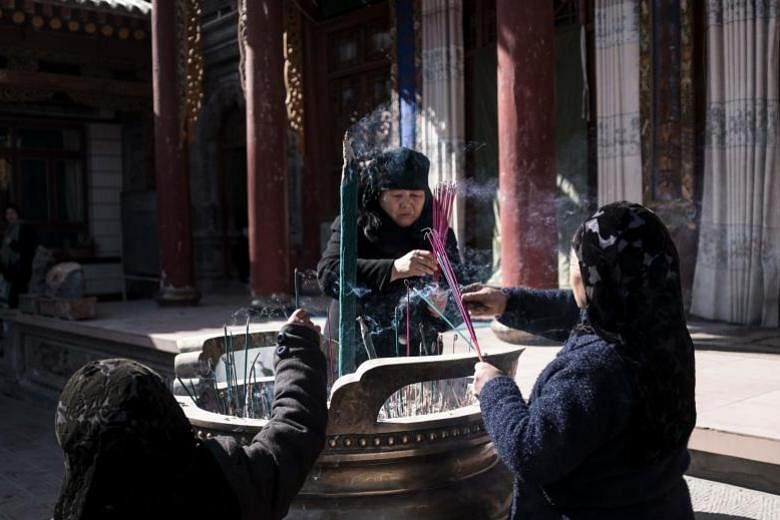BEIJING • The Chinese authorities have drafted sweeping new regulations that would severely restrict religious content online, including images or even descriptions of religious activities such as praying, chanting or the burning of incense.
The move comes as Beijing tightens the screws on religion, especially for followers of Islam and Christianity.
The new rules would allow only members of officially licensed organisations to post certain kinds of religious content, according to a draft document published online on Monday by the Bureau of Religious Affairs.
Individuals would be forbidden from posting photos, videos and even text related to religious activities, or sharing links related to preaching.
Organisations that break the rules could be shut down, the document said, but it did not detail penalties for individuals, beyond saying that any violations would be handled according to the law.
China's officially atheist government is wary of any organised movements outside its own control, including religious ones, and analysts say oversight of such groups has tightened under President Xi Jinping.
While Beijing officially recognises five religions, it imposes strict controls on how they may be practised - regulating everything from who can attend services to what can be said by religious leaders.
The regulations are intended to promote social stability and stop religious fraud, cults and appeals to extremism, the document said.
The propagation of religious information within China by any overseas individuals and organisations would also be banned.
The regulations could make it illegal to publish information about virtually any kind of religious activity - even pictures from a wedding ceremony - according to Mr Jeremy Daum, an expert on Chinese law.
"As they currently read, the measures cast the net far too wide," he said, adding that "even parts of traditional Chinese culture over which the (Communist) Party is rightly proud will be excluded".
China's top leaders recently called for religious practices to be brought in line with traditional Chinese values and culture, sparking concern among rights groups.
State supervision of religion has increased in a bid to block extremism. In areas with significant Muslim populations, the authorities have removed Islamic symbols, such as crescents, from public spaces.
In the far-western region of Xinjiang, Uighurs and other Turkic Muslim minorities are harshly punished for violating regulations that ban beards and burqas, and even for the unauthorised possession of the Quran.
Up to a million minorities are believed to be held in extrajudicial re-education camps in Xinjiang, rights groups say.
Beijing officials have also shut down one of China's largest underground Protestant churches for operating without a licence.
Around 70 officials stormed into the Zion Church - housed on the third floor of a nondescript office building in the north of the capital - after its Sunday afternoon service, said church pastor Jin Mingri.
Christians in China are split between those who attend unofficial "house" or "underground" churches and those who go to government-sanctioned places of worship.
Zion was one of the largest "house" churches in Beijing, with up to 1,500 people at its weekly services.
AGENCE FRANCE-PRESSE

